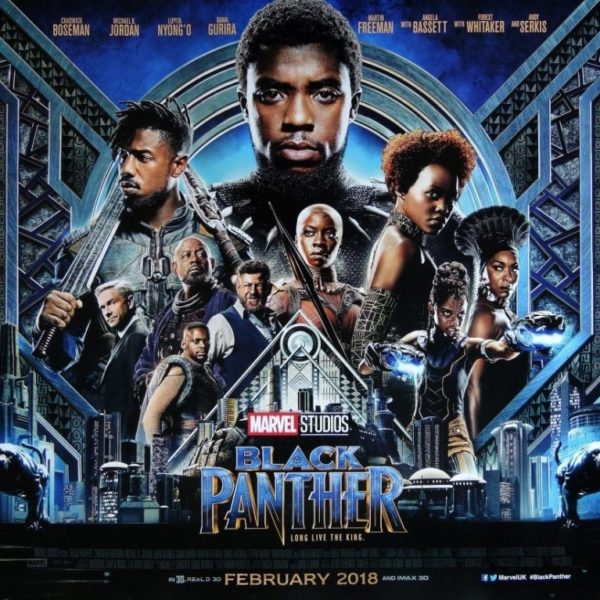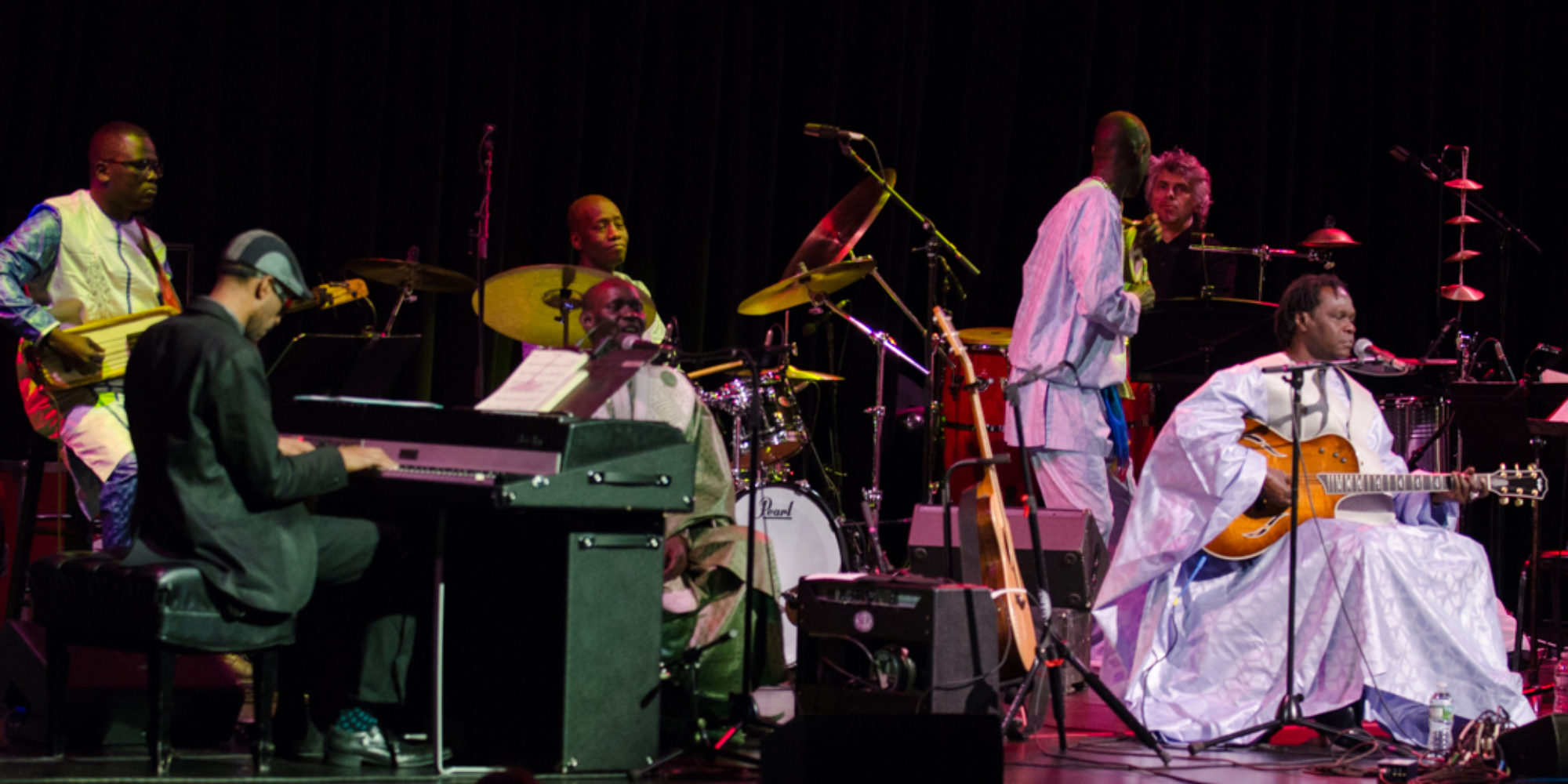Senegalese superstar Baaba Maal performed a special concert at The Town Hall in New York City on Sat., May 4. He brought just four musicians, Cheikh Ndoye (ngoni and drums), Aliou Diouf (drums), Massamba Diop (talking drum), and his longtime friend and vocal accompanist, Mansour Seck. But they were joined by 13 others under the direction of trumpeter and arranger Steven Bernstein. The show began in acoustic mode with Baaba and Mansour seated, and joined by a few members of the ensemble, adding lovely violin, cello, percussion and keyboards.
As the show built, the entire group came on stage adding brass, electric guitar, more percussion, and working through adventurous new arrangements of classic songs, “Djam Leelii,” “Koni,” “Baayo,” “African Woman,” and “Gorel,” among others. The mix was rich, and Baaba seemed delighted with the improvisations by the excellent players Bernstein had assembled. The show ended with “Diahowo,” the haunting song that Baaba and Mansour have used to bring down houses all around the world for some three decades.
After the show, Banning Eyre and Sean Barlow caught up with Baaba backstage for a brief interview. Here’s their conversation.
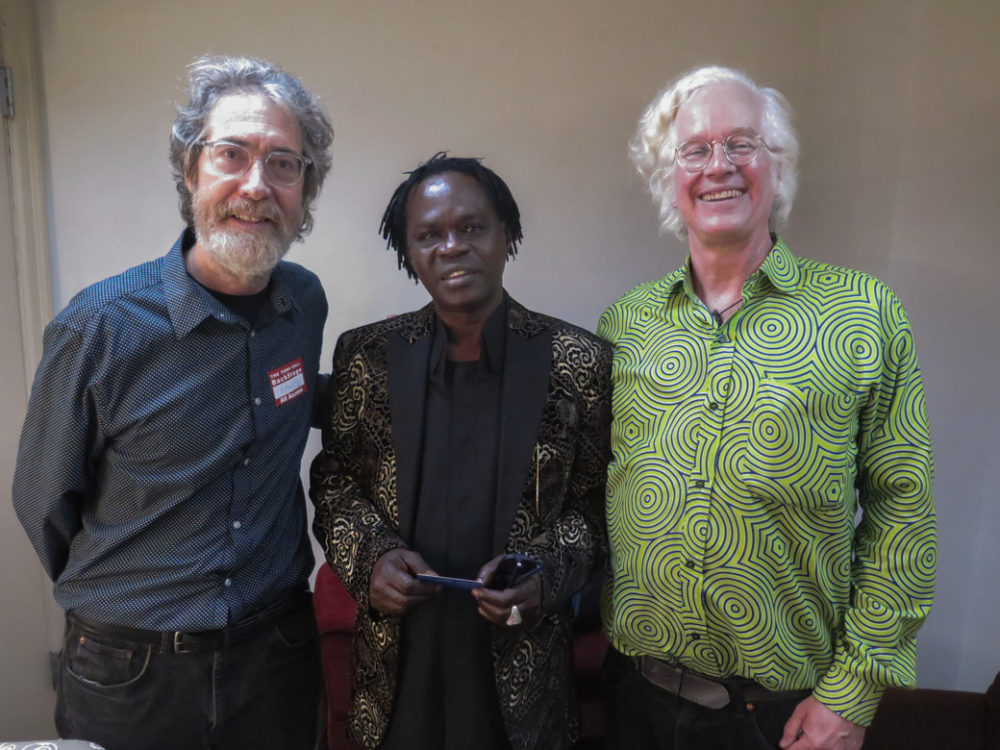
Sean Barlow: Before we start, I just want to thank you for all the incredible hospitality you've shown us over the years in Senegal. Especially when we brought listeners there. You invited us to your country home, and it was such a great experience. Thank you.
Baaba Maal: It was my absolute pleasure.
Sean: And one of my favorite memories was what we were able to induct you and Mansour into the Afropop Hall of Fame.
Oh yes. I remember.
Banning: And we all ate at Pierre Thiam’s Senegalese restaurant, Yolele, in Brooklyn.
I ran into Pierre recently in Senegal. Is he here now? Because I heard that he was back in Senegal organizing some kind of a festival of culinary arts.
Sean: He is doing that. But he has also just opened a wonderful restaurant called Teranga at the Africa Center in Harlem. He's got a lot going on.
And he gave me his cookbook. It did help me to cook myself some of my favorites. I have to tell him that. Especially caldo (fish yassa), which is my favorite.
Banning: Is that right? We will tell him. Because he now has the first public space in the new Africa Center. It's a small space so far, but they do have music there.
There's a place to perform?
Yes. It's intimate.
Intimate. I like that.
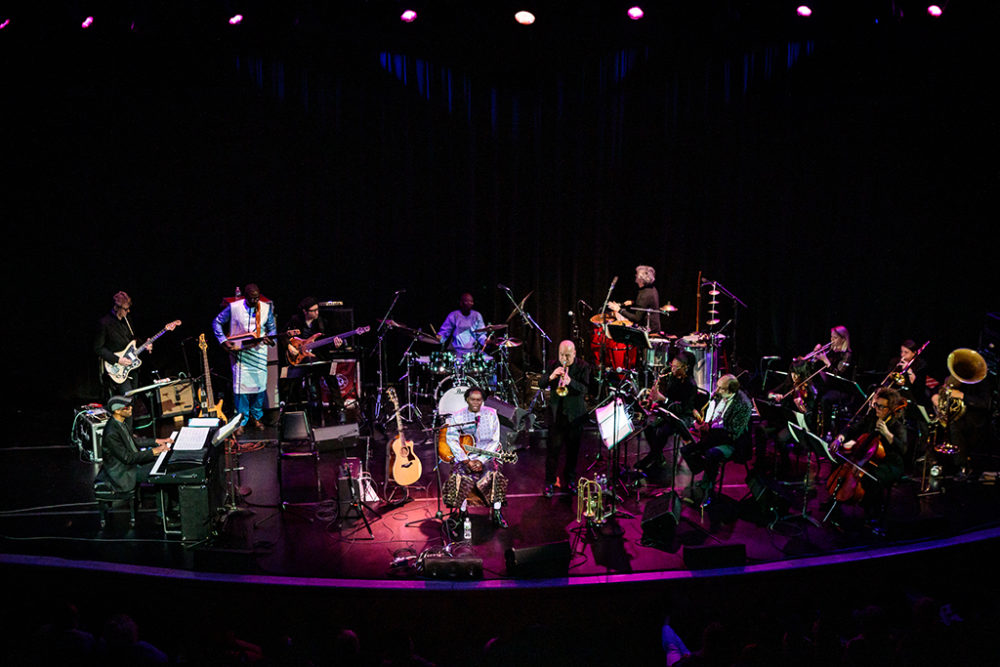
Well, that story is just beginning, and Afropop hopes to be part of it. But hey, we're here to talk about tonight. What a concert! What's the story of this concert?
Oh, the story is I wanted so much to do some other things, to have a mini-project. So I took three members of the band, just a quartet, to play songs that we don't usually get to play with Dande Lenol, and then I wanted to see where African music can meet with classical music from the West. I was talking with some friends about how Western music came into Africa, for example in Guinea when they started using the acoustic guitar from the West to play African melodies. There are stories between the two communities, this clash that really made something happen.
I wanted to see where this could really come together, and then Suzette [Newman, Baaba’s manager] came and said, "Maybe you should try something in New York. I think this is the best place to try it. If it works, we'll just carry on to the rest of the world."
So how did you find it working with Steven Bernstein, your chief collaborator here?
I like him. I was a little bit nervous about how this would work in such a short time. We had just about one month. I sent him the set list, and he had to listen to the songs and write all the different parts. For example, “Njilou,” I know we have the guitar, the bass, the drums and also the violin and all of that. He had to write that and give it to some classical instruments. He did a very nice job with that. The tuba, the violins and the cello. It's really good.
So you picked the songs.
Yes. I made a list of the songs. It was something like 13, maybe 15 songs. And we had to choose among them. Because I wanted the show also to be starting with something on my own so that we would end up playing dance songs together.
It was so nice hearing you play acoustic with Mansour, like the old days.
Yes. I knew if I didn't do that, people would miss that. I had to build it slowly and bring people in one by one to end up making something like a fusion.
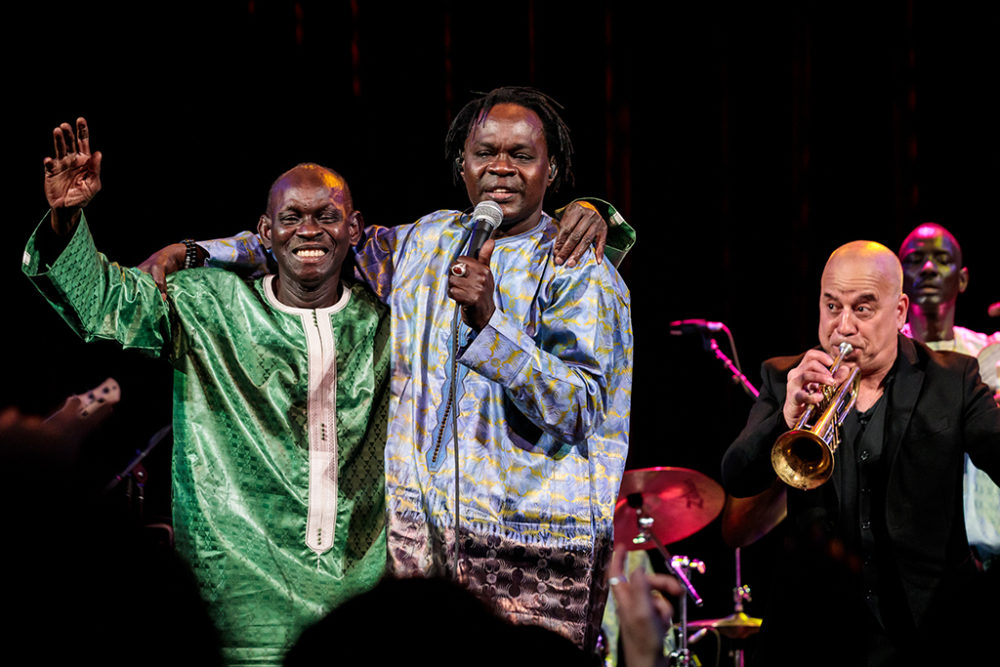
What was it like when you are rehearsing with these guys? There must been pressure to get it all right in a short time.
The first day we were rehearsing, I could see in the faces of these people that they were asking themselves whether I would like what they were playing. Is it what I expected to hear from them? Even Steven. And I said to him, “Hey, you know, Steven, it's about music. You bring some elements. I give you some information about the songs. The rest of it should come from you, and you should be free to bring something you like. It's just free. It's not European music. It's not African music. It's not world music. It's just music. Just think about this, and let's do some magic.”
So he had created arrangements for the songs.
Some of the arrangements were already there in the song, like “African Woman,” or “Njilou.” You don't have to miss that, or people will feel that it's really gone far away.
But he added a lot. All those lovely solos by the instrumentalists.
Yes. He did come with some ideas. He said, “Why don't we do this? When you finish ‘Koni,’ I have two different parts that I want to end the song with.” And I said, "Good. Do whatever you want to do. It's open." I'm sure it's going to be nice, because I've listened to the music. I see the passion. And I know these are great musicians. Very good musicians.
But today, what I was really surprised by was when they all stood up and started jamming and improvising. That was not in the rehearsal. I said, “We are going to do the concert. Whatever happens, just follow me. If I give you some energy, you give me some energy back. Just let yourself go. Especially when Mansour Seck comes, or Mamadou Diop comes. They will take you to another level.” That was the purpose of bringing them.
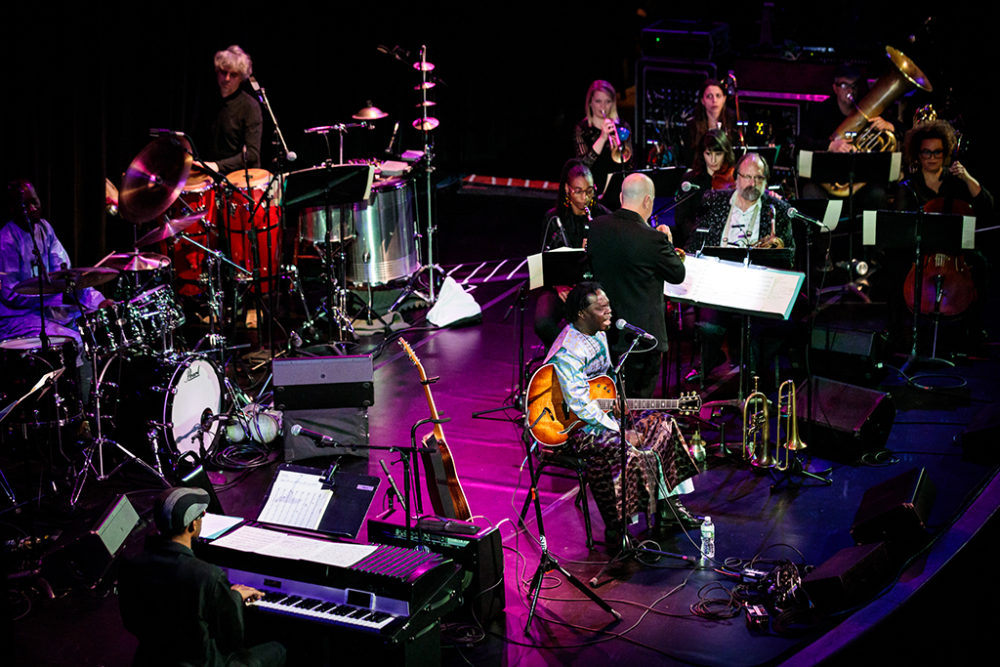
They certainly rose to the occasion. It was a beautiful finale. You picked some of my favorite songs. “Baayo,” and “Gorel, “and “African Woman.” Man, they swung that one hard. I have always loved that song. You know, there have been so many fusions of Afro-Cuban music and Senegalese music going back to the Star Band and Orchestra Baobab. It’s a rich history.
Yes, yes.
But you really put a special twist on it with that song. Who did the horn arrangement for that originally.
It was arranged by Simon Emerson, but it was played by the Kicking Horns in London.
That's right. Simon did a fine job on that album, Firin’ in Fouta.
We had some of the parts for the horns already with Dande Lenol, but when we went to Real World to record it, Simon Emerson had this new arrangement to make it more for the big stage.
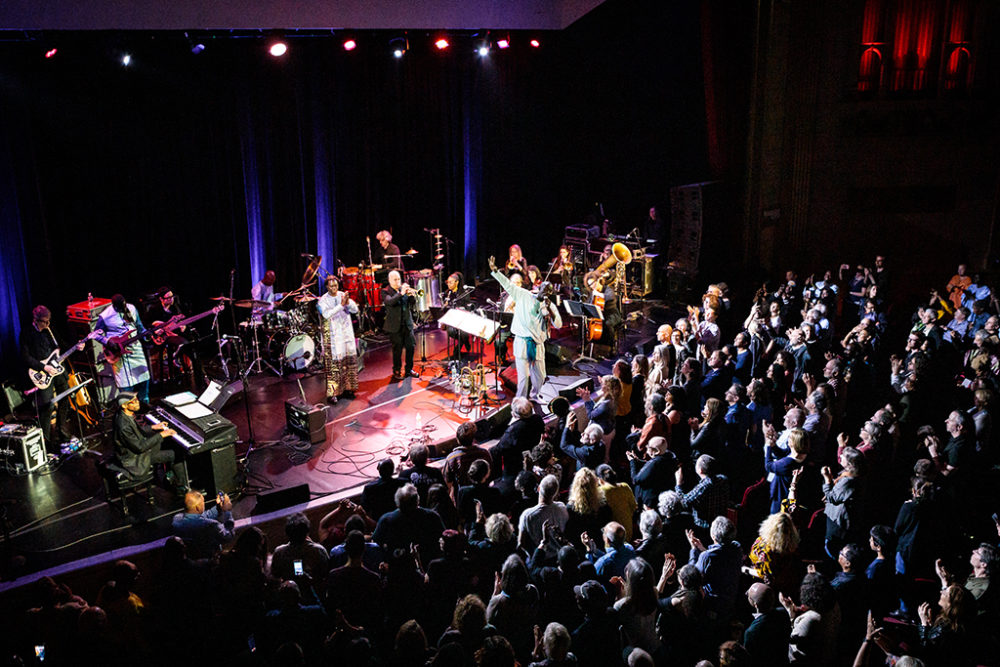
You like collaborating with people, don't you? The last few times we've seen you here, it’s been in some sort of collaboration, with Mumford and Sons, and now this project. Is that something you are more interested in doing these days, working with other people from different genres?
I feel O.K. to present my own stuff if I have an album that I have to promote. That's more professional. But just for the music, I love collaborating with people. I've done a lot of collaborations, and we’re going to go back in the studio and do more with Mumford and Sons. We were touring together with Massamba, and I really did like that. And through that, I met a lot of groups that I've really appreciated listening to. So to be able to see them and sit down with them and talk about music first, and then to play music. That's really interesting. I think it keeps me alive. Musically alive.
And then there was Black Panther. What a phenomenon. We were very proud to hear your name shouted out at the Oscars.
Sean: when I saw the film, I did not know you were going to be in it, and the second I heard your voice it was, "That's Baaba Maal!”
You didn't expect that.
No. Tell us how that happened.
Well, the whole story. You know, today, there was the man who produced my two latest albums in here. Johan Hugo.
Banning: Yes, we know Johan. From The Very Best.
He produced two of my albums, Television, and The Traveler. And now we are working on the next album together. So Johan is a good friend of Ludwig Gorensson. And Ludwig called Johan and said, “I want to meet someone like Baaba Maal. Can you introduce me to him because I'm writing music for the film Black Panther?” Ludwig said to the producers that he needed to go to Africa to be in touch with things to be able to bring something real because it's an African story. So he called me, I said I can help.
I was not supposed to be singing in the movie. Or maybe they were expecting that, but for me, it was just to record the music with the instruments. So he came to Senegal, but I couldn't change what I was doing. I was on tour in Fouta for 10 days. He arrived in the day, and I said, "Hey, man, tonight I have to leave with the band. If you have time, we can go together for 10 days, and when we come back, we’re going to set up the studio." Because now I have a very nice studio in my house. He said, "Oh yeah, let's go."
That's it. And actually it was very good for him because when he saw the performance of the band Dande Lenol, how we play in the night, how we go on the stage, the ceremonial dramatic things that people do before I jump on stage. He said, "Yes. That's something I want to have in Black Panther." So when we came back, we started recording the percussion, Massamba and all that. And at the end of the recordings, he just asked me, "I have one song, one particular song in a certain part of the movie. I want you to talk to Ryan Coogler, the filmmaker. He's going to explain to you what's going on, what it's about.” And I spoke to Ryan, and he said, "Please, try something. Try your voice on it. If it works, it works. If it doesn't work, we’ll leave it." And I tried the song. He said, that's it. That's what ended up in the movie.
Because when I spoke to Ryan, I said, "This is easy. Because what you're talking about: this former king is going, and there's going to be a new king. It's like many of the stories in Africa. The story of Samba Guelal, the story of Sunjata…. It's easy to pick one classical song that we can match with this kind of a story.
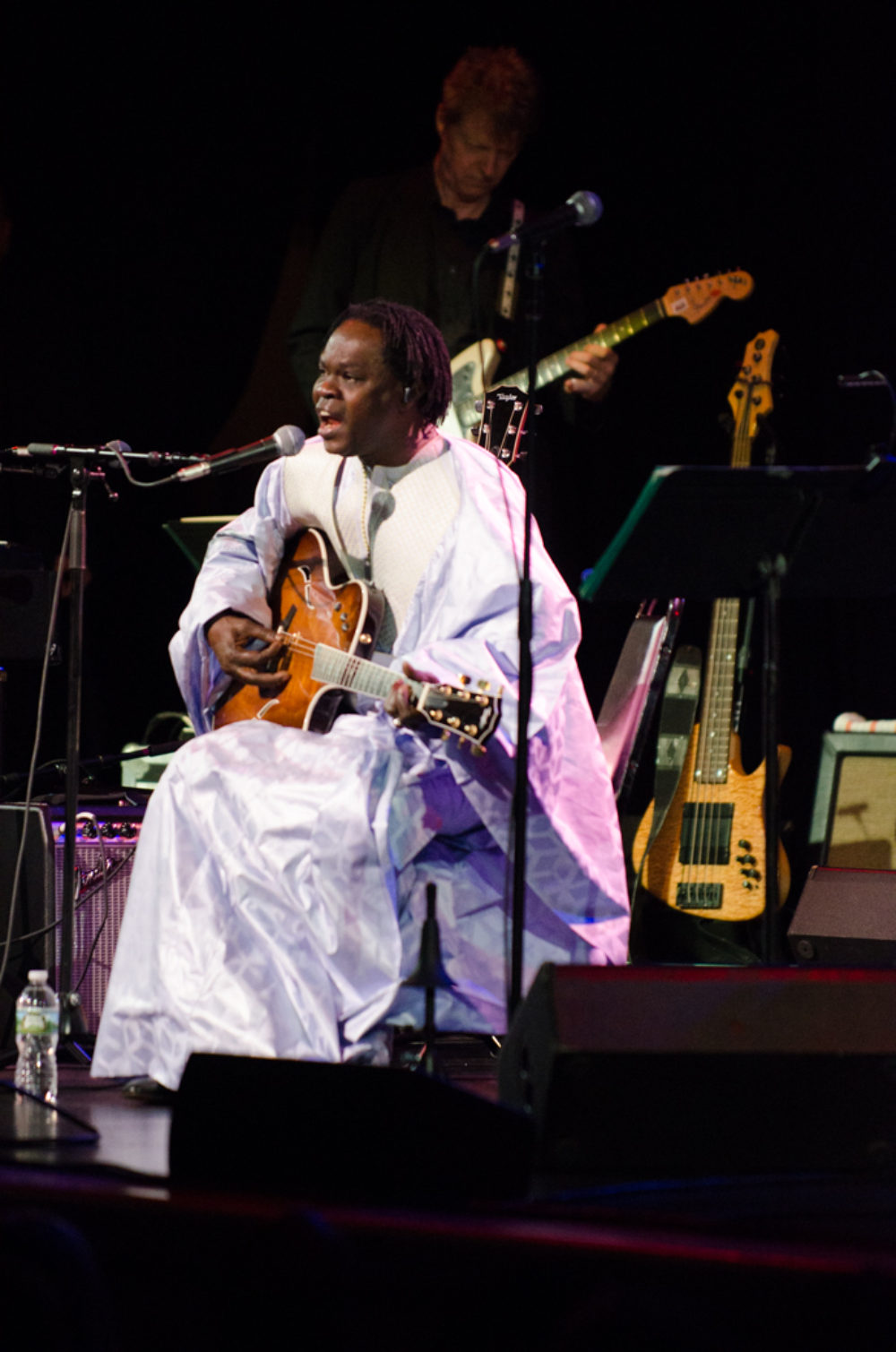
But you wrote this song.
Yes. And when I spoke to Ryan about it, I said, "Yes, this is an African story. It's putting Africa upfront." I knew it would be a big movie, but I was very surprised to see how huge. When they called me for the premiere in Los Angeles, I said, "No, I'm not coming. Because I'm touring." And then two weeks later they said were doing another preview in London. And I said, "No, I'm not coming." And then people started calling me from all over the world saying, "Congratulations. This is big." And so I said, "Baaba Maal, you have to go to London to see this movie. Because it's not here in Dakar." So I got a ticket and went to London. I told Suzette, “I have to see this movie.” And I was surprised when I went to the cinema and I understood why.
It's a very rich film, visually, musically. People really got into it.
I saw that in London. The different places where it was showing, and people were there sitting with friends, having food, playing music, getting ready, having their African clothes on. I had to hide until everyone got in so I could come in and take my place, and when my voice just came up, I crouched down. And when it was finished, I had to let everyone go before I left.
What a great story. Has it changed anything for you? Has it opened doors?
Oh yeah. Oh yeah. Many doors. The good thing is that in Senegal, people really see it as an opportunity for Senegal, and Africa. Now it's up to the people in the culture to capitalize that. Because this is going to bring attention to African culture, talking about the music and the instruments, about the filmmakers too. It was projected in many places. And very young people who make movies came to me afterwards. You know, this is the 10th movie I have participated in for the writing of the music. I did Black Hawk Down. Guelwaar from [Ousmane] Sembene, The Last Temptation of Christ… But this one was something else.
And in Senegal, from the president to the first lady, they were all sending messages of congratulation. But we have to capitalize on that. We have to know that now people have an eye for African culture in all its diversity, the clothes, the hairdressing, the stories. We have so many things that are similar to Black Panther that we can develop in movies.
And the good thing is that we ended up with someone called Papiss Niang, a filmmaker and videomaker. He is working on a school to educate kids in film, lighting, editing, many different things. And I think we’re going to have support from the government to make that happen.
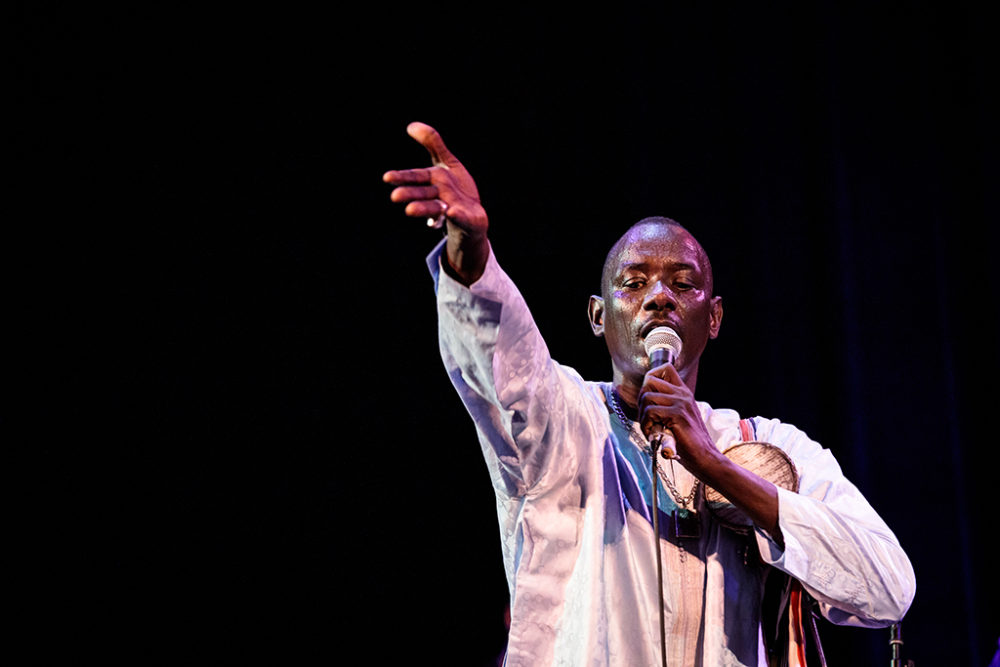
That's great. Look what's happening in Nigeria with their film industry. It's huge.
Something like that. But we need to form the young people, because to be competitive with all these industries in the movies, you need to know the technology.
Sean: Baaba, I know you spend a lot of time in Dakar. But when you go up for your own festival in Podor, can you tell us about some of the artists up there that you're especially excited about now?
Oh, there are many of them. From Podor, you have the son of my former manager, Mbassou. His name is Kane Diallo. He is doing very well.
You have another called Demba Guisse. He is also doing very well
And then you have the young ladies. One is called Coumba Tamba.
Tell us about your festival.
The festival is going very well. It's getting huge. Two years ago, Mumford and Sons came to play there. They threw everything behind. They took two planes, one landed in Dakar, one in Saint-Louis. And they came and played in Podor. People were just like, “What the hell is that?” But they came, you know. And they really lifted up the festival. We did one edition between Senegal and Mauritania, and the security said that in the four days of the festival, 1,500,000 people came in and out.
Amazing.
You can see the pictures. I've never seen anything like that. People came with their families for the three days, four days. Just for the festival. That was huge. It's just getting bigger and bigger.
Congratulations. We must come.
Now, it's not anymore my festival. Is for the people of Podor.
Well, good for you. That's how it should be. It's so great to talk with you again.
Thank you very much.
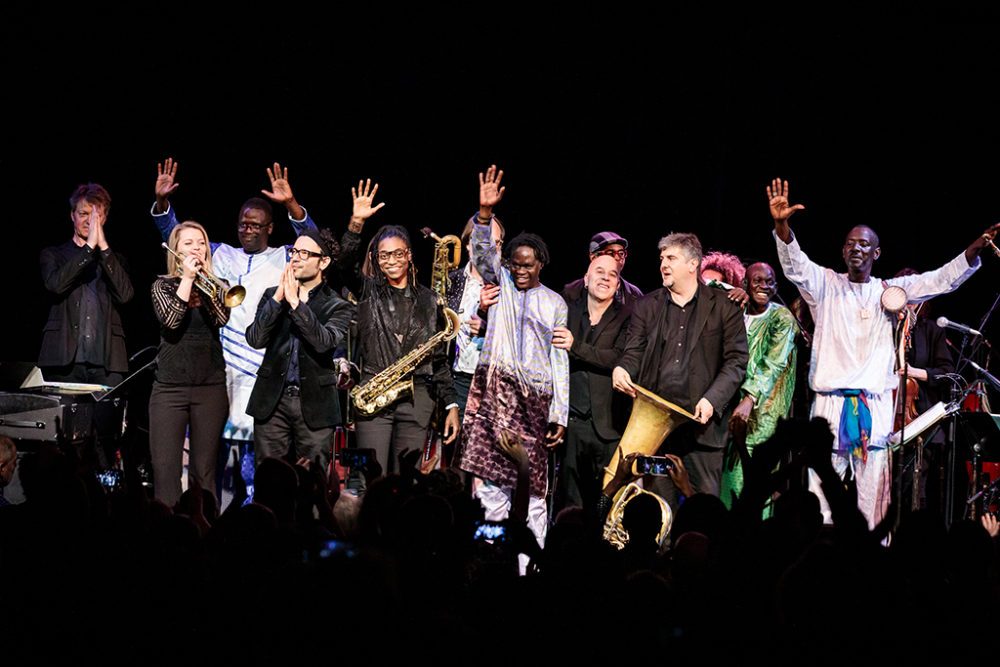
Related Articles
